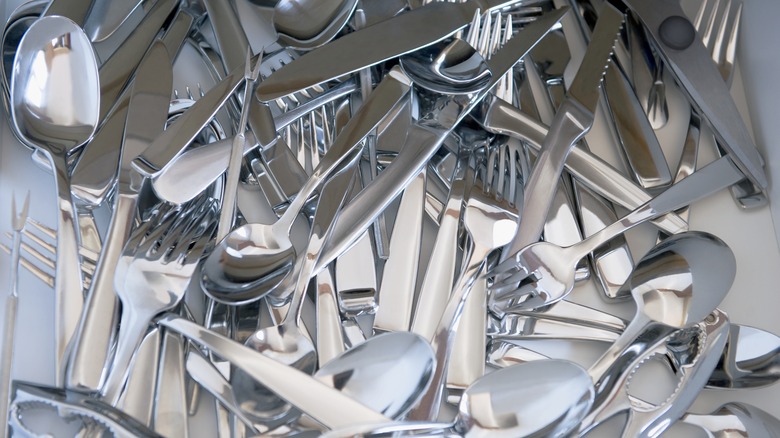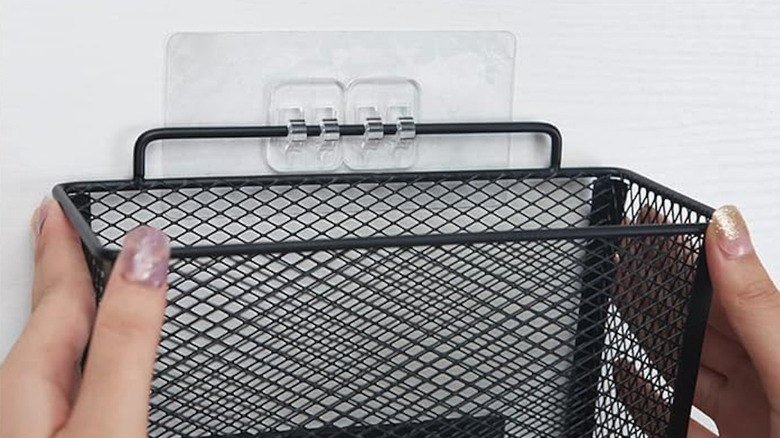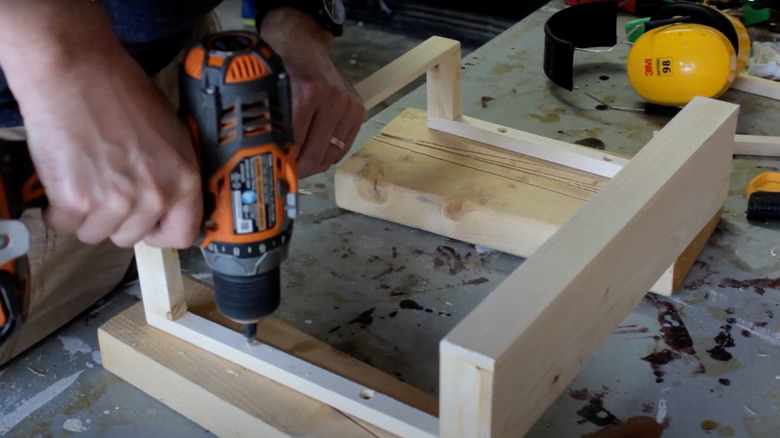Try This Cabinet Hack For Storing Silverware If You Don't Have Drawer Space
We may receive a commission on purchases made from links.
There's nothing worse than struggling to squeeze silverware into overflowing kitchen drawers, or worse, resorting to storing spoons and forks in a utensil holder or dish rack. But without enough drawer space (or no drawers to begin with), finding a suitable space for cutlery may be a real head scratcher. On the one hand, you want these items close at hand for every time you eat a meal; on the other, you don't want them to create clutter in the kitchen. If you're finding yourself in this situation, installing a cabinet door pocket or caddy may quickly bring order to your cutlery and end their reign of chaos.
Cabinet doors are uniquely suited for concealing storage that's both at hand and out of the way. Also, there's such a wide assortment of door-mounted caddies, pouches, and other types of holders that you'll probably have no trouble finding one with the right functionality and aesthetic. Below, we'll walk you through the steps for finding a suitable cabinet door storage solution for your silverware. We'll also show you an easy DIY method for building your own cabinet door cutlery holder.
Kitchen cabinet door storage options (and how to choose the best one)
There are a multitude of cabinet door storage options, so you may rightly feel overwhelmed and not know which one to choose. The key factors to consider are the unit's size, style, price, and fastening mechanism. Getting the size right is vital if your cabinet has shelves in it. Obviously, if the door storage unit is too deep, the cabinet shelves won't give the door enough clearance to close properly. To get the clearances right, calculate the difference between the depth of the shelf and the total depth of the cabinet's frame — this number is the maximum depth of the door storage unit if cabinet shelving will get in its way. To avoid this scenario, you can also place the unit between shelves. In this case, you should make sure the unit's height doesn't exceed the vertical distance from one shelf to the one above it.
Likewise, consider the type of unit. Some units offer compact dimensions and a good price point, but their wire composition just isn't suitable for silverware. You need something with a solid (or at least mesh) bottom, so the cutlery doesn't slip through the gaps. On the other hand, a mesh alternative like this one from Amazon could make a sturdy home for your forks and knives, and it's reasonably priced at $19.99. The final factor to think about is the fastening mechanism, and your options are adhesive pads, over-the-cabinet hooks, or screws.
How to build your own kitchen cabinet door caddy
Not thrilled with the commercially-sold door storage options? The good news is that building your own wooden caddy is a mind-blowingly simple DIY woodworking project. Essentially, you're just building an open-top box and screwing it on to the door.
To start, you'll need to arrive at the correct measurements for the storage unit. As discussed above, measure the distances between the cabinet shelves, and between the shelves and the door, to get your clearances and maximum height and depth dimensions. Armed with this information, you can assemble the tools and materials. You'll need a 6-inch by 1-inch plank, some wood glue, a few screws, and some basic home woodworking tools, like a saw, a sanding block, and a drill with threaded and driver bits. Of course, you better wear some protective gear and follow basic woodworking safety precautions.
Begin by cutting the 1 by 6 widthwise to get the desired length of the front panel. Next, use the same plank to cut the side panels. Make these extend above the front piece, so you can drive screws through them and into the cabinet door. Finally, cut the bottom piece by cutting the plank lengthwise to achieve the right depth. Now, glue and clamp the pieces together. Once the wood glue has had time to dry, sand the box and fasten it to the inside of the cabinet door with screws.


